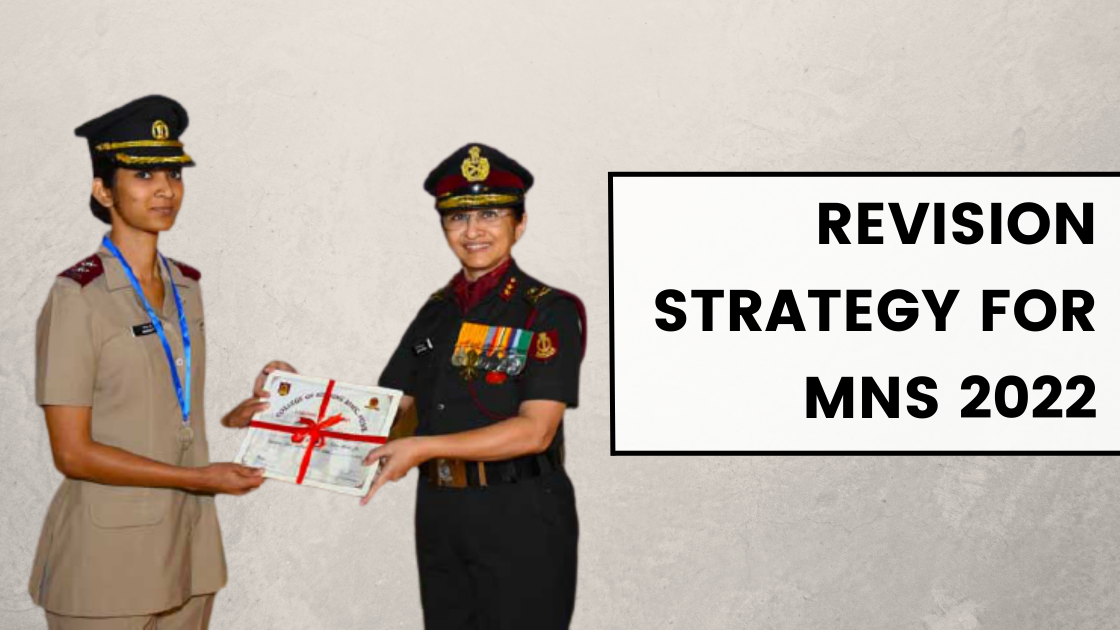There are no items in your cart
Add More
Add More
| Item Details | Price | ||
|---|---|---|---|

When it comes to the most strenuous career possibilities for young female applicants looking to enter the armed forces, the Military Nursing Service - MNS Exam is always at the top of the list.
To be considered for enrolment to the 4-Year BSc Nursing Program with a total of 220 openings provided by the Armed Services Medical College and Command Hospitals, young female hopefuls must pass the MNS entrance test with distinction in both the written and interview rounds.
Ultimately, after completing all phases, candidates are admitted to Armed Forces Medical Colleges and Command Hospitals on the basis of merit-cum-choice.
Here are a few Revision Strategies for MNS 2022 Preparation:
Mind maps can be an excellent tool for identifying links between ideas. They don't have to be boring; you may utilize colors and visuals to help with recall. If you prefer to build mind maps digitally, there are free programs available such as MindMeister, canva, and mindmups. Drawing diagrams can also help you remember procedures or cycles.
Flashcards allow you to practice summarising material and can assist you in identifying any learning gaps. They can be used in a variety of ways, including
· Consolidate notes about a given topic onto a card.
· On one side, write a phrase and on the other, a definition.
· On one side, write a query and on the other, a response.
Colors and visuals can be utilized to boost your memory; they can also be employed if you wish to be tested by your family. To make flashcards, you can use various software.
Explaining concepts to others may often help your own recall and comprehension; revising as a group can also allow you to question and test each other and exchange sample answers.
There are numerous apps and technologies available to help you do this online, including Zoom, Skype, Google Hangouts, and WhatsApp/Facebook Messenger app.
Utilize songs, riddles, or tales to teach facts, such as 'Horace went down a well and started laughing' - Horace Wells was an American dentist who was among the first to use nitrogen oxides (laughing gas) on his clients on a regular basis.
Labels can also be used to help you remember knowledge. Make a memorable phrase out of the first letter of a sequence of words.
Working through prior papers or practice questions is an excellent approach to test your knowledge if you have access to them. Plan the structure for your answers in advance. To analyze points for and against a concept, use lists. Experiment with writing ideas and entire responses to previous exam questions either with or without your revision notes.
If you experience difficulties by hearing, record yourself speaking out brief sections of your lessons on your phone.
You may listen to your tapes whenever you want, making it simple to discover more brief revision sessions.
Post-it notes are useful for the end of the analysis and remembering important facts.
Use colors to define themes and hang them about your home - but shift them around frequently so you don't grow used to seeing them in one spot.
To get in the correct state of mind, read your writings and other tasks. Consider your opinion, both the positive and the negative aspects. Repetition of the former; attempt to alter the latter.
The approaches listed below are passive and are unlikely to assist you in engaging with big measures of data.
Typing out all of your notes- Until you need all of your notes in digital form, this is a waste of time because it is not a technique that needs much brain function and focuses.
Reviewing your notes is passive since you are not doing much to retain what you are viewing in your head.
Trying to copy material- this is a time-consuming task that does not engage your mind sufficiently to help you retain the content.
Highlighting- it is quite easy to blindly over-highlight the entirety of a page; when coupled with marking, this strategy can be beneficial; nevertheless, on its alone, it tends to be ineffective.
Make use of active revision strategies.
Vary the stuff you revise, starting with the tough and working your way up to the more familiar. It becomes more engaging as a result, and little bits are easier to recall.
Take frequent pauses, but stick to your revision schedule. Even when you are taking a vacation, your mind will continue to work, often sorting out difficult ideas!
Give yourself sweets and rewards to motivate you to keep going.
It can be difficult to stay active when working solo at home. It is critical to developing a routine - set an alarm, dress, and have breakfast, as usual, to prepare for the day. If you're having trouble staying focused, check out our sections on coping with interruptions.